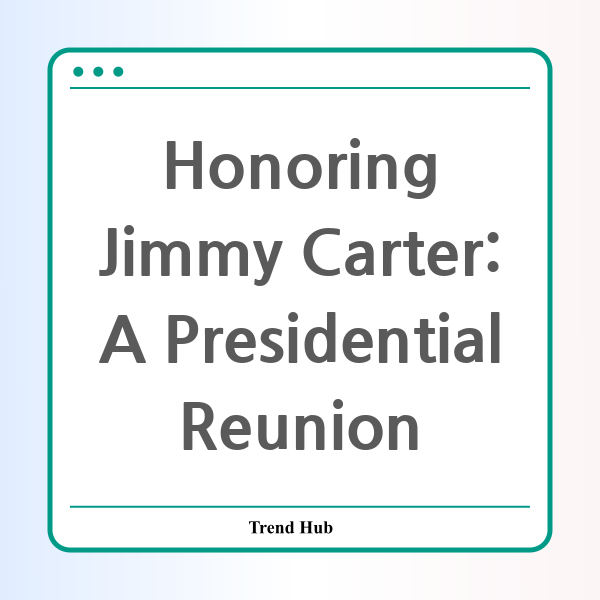* This website participates in the Amazon Affiliate Program and earns from qualifying purchases.

What does it mean to stand united at a time of division? This question will resonate deeply as all five living members of the so-called "Presidents Club" gather to honor the legacy of former President Jimmy Carter. Scheduled amidst a backdrop of political unrest and factionalism, this rare convening marks a poignant moment in American history.
Jimmy Carter, who served from 1977 to 1981 and recently passed away at the age of 100, holds a unique place among American presidents. His four decades of post-presidency life were characterized by humanitarian efforts and a devotion to peace, making him a figure revered across party lines. The gathering will bring together Presidents Bill Clinton, George W. Bush, Barack Obama, and perhaps even Donald Trump, to pay tribute to a man whose presidency often felt like an outlier among his peers.
From the beginnings of his political career, Carter faced challenges that shaped not only his time in the Oval Office but also how he would be remembered. His presidency ended amid economic turmoil and the Iran hostage crisis, leading to perceptions of failure that overshadowed his post-presidential achievements. Despite this fraught legacy, he carved out a new path that emphasized charity and global diplomacy through initiatives such as the Carter Center.
As the nation watches, this meeting of the Presidents Club will be closely scrutinized not just for the tributes paid to Carter, but also for the dynamics at play among the present attendees. Historically, the relationships between these men have been complex, often influenced by their individual political legacies and rivalries. For instance, Carter has had a notable, albeit occasionally contentious, relationship with each of the modern presidents.
Barack Obama, for example, while praising Carter’s global vision and humanitarian contributions, has frequently been seen as distancing himself from the former president during his own tenure. This was exemplified when Carter noted that Obama had not reached out for guidance, particularly on sensitive issues like the Israel-Palestine conflict.
Similarly, George W. Bush and Jimmy Carter maintained an unusual relationship. While they often critiqued each other publicly, they also found common ground, particularly following the opening of the George W. Bush Presidential Center where Carter shared admiration for Bush’s decisions regarding humanitarian efforts abroad.
Donald Trump’s presence adds another layer of intrigue. Known for his polarizing politics, Trump has criticized Carter’s presidency during his own terms while also offering condolences upon Carter’s death, a reflection of the complicated nature of political legacies. Trump’s comments on Carter’s perceived failures regarding the Panama Canal and the Iran hostage crisis highlight the stark contrast in how different administrations view their predecessors.
Moreover, Carter's influence on future generations cannot be overstated. Despite being politically marginalized during the tenures of his successors, he has held a significant voter base, particularly among Democrats who view him as a moral compass. His ability to address issues of human rights and diplomacy resonates strongly today, perhaps even more so than during his presidency.
As we approach the state funeral at Washington National Cathedral, President Joe Biden, who has often expressed deep admiration for Carter, is set to deliver remarks honoring the late president. Their relationship is deeply rooted, with Biden being one of the first senators to support Carter’s presidential run in 1976. This bond stands in stark contrast to the ambivalence exhibited by other presidents, suggesting a generational shift in how political legacies are perceived and embraced.
The gathering of these five presidents is not just an homage to Jimmy Carter but a reflection on the nature of leadership and the legacy that each president leaves behind. In a time of heightened political tension and social division, this reunion serves as a reminder of the shared responsibility of leadership and the importance of unity in service of the nation.
Carter’s commitment to service and peaceful coexistence may inspire the current and future leaders to reflect on their roles and responsibilities. The question remains: Can this gathering serve as a catalyst for a renewed sense of cooperation among current and former leaders? As the nation pauses to remember a man who championed choices and compassion, let us hope that the example he set will resonate beyond the boundaries of the Presidents Club, influencing a new generation of leaders to prioritize integrity and humanity in their public service.
* This website participates in the Amazon Affiliate Program and earns from qualifying purchases.